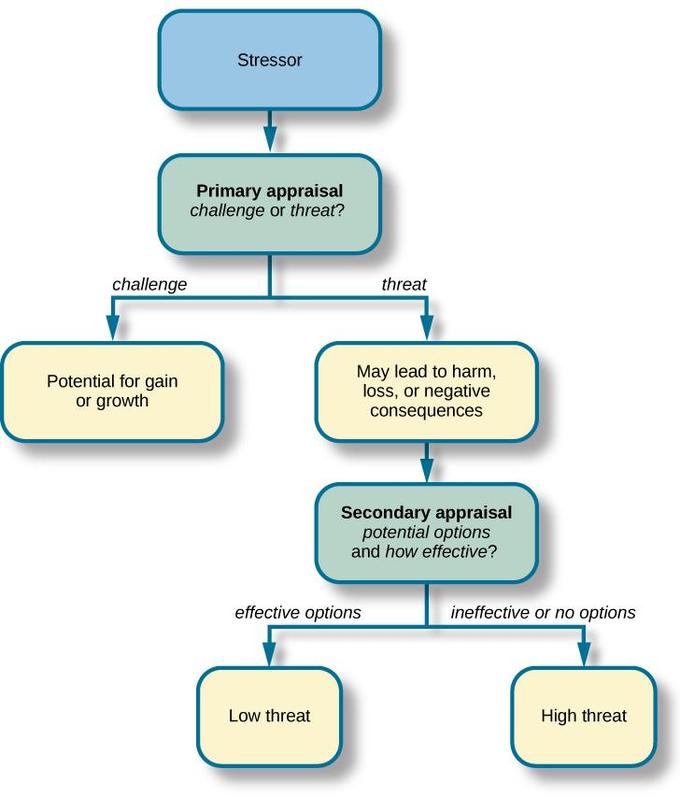Introduction
Emotion has long been a central subject of study in psychology, with various theoretical frameworks attempting to explain how humans experience and regulate emotions. Among these, Richard S. Lazarus’s Theory of Emotion stands out as a significant contribution. His theory posits that emotions are not direct responses to external events but rather arise from an individual’s appraisal or interpretation of these events.
Read More- Positive Emotions
The Cognitive Appraisal Process
Lazarus’s theory revolves around the concept of cognitive appraisal, which refers to the mental process through which individuals evaluate the significance of a given event. The appraisal process consists of two key stages-

Lazarus’s Theory of Emotion
1. Primary Appraisal
This is the initial stage where an individual assesses whether an event is relevant to their well-being. The evaluation involves determining the following:
- Irrelevance: The event holds no significant impact, leading to no emotional reaction.
- Benign-positive: The event is perceived as beneficial, resulting in positive emotions like happiness, gratitude, or relief.
- Stressful: The event is interpreted as harmful, threatening, or challenging, leading to negative emotions such as fear, anger, or sadness.
2. Secondary Appraisal
Once an event is deemed significant, the individual assesses their coping resources and available options for dealing with the situation. This evaluation includes:
- Perceived Control: Assessing the extent to which one can influence or alter the situation.
- Coping Strategies: Identifying mechanisms to handle the stressor effectively.
- Outcome Expectancy: Predicting the possible consequences of different coping actions.
This stage determines the intensity and nature of the emotional response. If a person believes they can manage the situation, they may experience confidence or determination. Conversely, if they perceive inadequate resources, they might feel anxiety, frustration, or despair.
Types of Coping Strategies
Coping plays a crucial role in emotional regulation. Lazarus categorized coping strategies into two broad types-

Coping Processes
1. Problem-Focused Coping
This strategy involves taking direct action to change or eliminate the stressor. It is commonly employed when an individual perceives a situation as controllable. Examples include:
- Creating a plan to address an academic challenge.
- Seeking additional resources or support to solve a problem.
- Making lifestyle changes to improve health.
2. Emotion-Focused Coping
When an individual perceives that they have little control over a situation, they may focus on regulating their emotional response rather than changing the situation itself. Examples include:
- Reappraising the situation to reduce its emotional impact.
- Engaging in relaxation techniques such as meditation or deep breathing.
- Seeking social support to manage emotional distress.
Empirical Evidence Supporting Lazarus’s Theory
Lazarus’s theory has been extensively researched, and various studies support its claims. Key empirical findings include:
- Smith & Lazarus (1993): Their study on appraisal components demonstrated that emotional responses vary based on how individuals interpret events rather than the events themselves.
- Schachter & Singer (1962): Although primarily focused on physiological responses, their findings indirectly support the cognitive component of emotional experience.
- Cognitive-Behavioral Therapy (CBT): The principles of cognitive appraisal are widely used in CBT to help individuals reframe negative thoughts and manage emotions effectively.
Criticisms and Limitations of the Theory
While Lazarus’s Cognitive Appraisal Theory has been widely accepted, it is not without criticism:
- Overemphasis on Cognition: Some researchers argue that emotions can be automatic and do not always require conscious cognitive appraisal.
- Cultural Variability: Emotional appraisal processes may differ across cultures, and Lazarus’s model may not fully account for these variations.
- Difficulty in Measuring Appraisal: The subjective nature of appraisal makes it challenging to quantify and study in experimental settings.
Conclusion
Lazarus’s Cognitive Appraisal Theory of Emotion remains a fundamental framework for understanding how emotions arise and influence behavior. By highlighting the role of cognitive interpretation in emotional experiences, the theory has shaped psychological research and practical applications in therapy, health, and workplace settings. Despite some criticisms, its contributions continue to influence the field of psychology and provide valuable insights into emotional regulation and coping mechanisms.
References
Lazarus, R. S. (1991). Emotion and Adaptation. Oxford University Press.
Reeve, J. (2017). Understanding Motivation and Emotion (7th ed.). Wiley.
Smith, C. A., & Lazarus, R. S. (1993). Appraisal components, core relational themes, and the emotions. Cognition & Emotion, 7(3-4), 233-269.
Schachter, S., & Singer, J. E. (1962). Cognitive, social, and physiological determinants of emotional state. Psychological Review, 69(5), 379-399.
Subscribe to Careershodh
Get the latest updates and insights.
Join 16,382 other subscribers!
Niwlikar, B. A. (2025, April 13). Lazarus’s Theory of Emotion and 2 Important Types of Appraisals. Careershodh. https://www.careershodh.com/lazaruss-theory-of-emotion/
